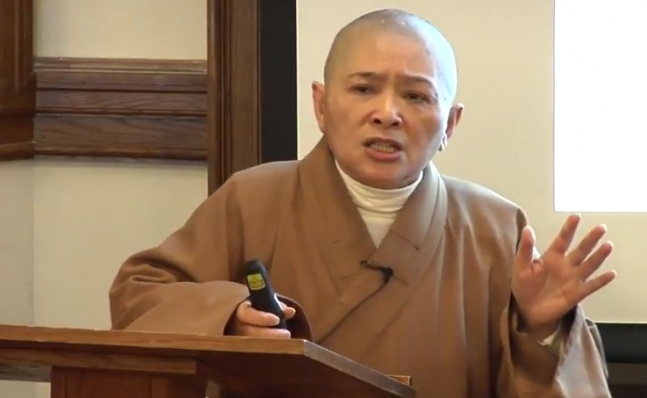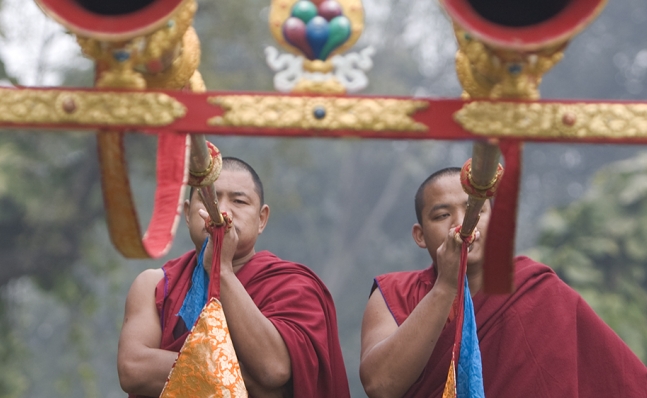A minor in Buddhist studies is an excellent adjunct to majors in such fields as religion, philosophy, American studies, anthropology, art history, Asian studies, comparative literature, East Asian languages and literature, East Asian studies, and the study of women and gender. It allows for a deeper focus in Buddhism, offering an interdisciplinary complement to your major as well as an important credential for graduate admissions.
Announcements
Listen to podcasts created by Smith students
Students in the spring 2022 course PHI 252 Buddhist Philosophy: Madyamaka and Yogācāra explored the applications of Buddhist philosophy outside of the classroom. They created a series of podcasts to showcase their findings which is accessible at their website Buddhist Philosophy and Buddhist Practice in the Pioneer Valley.
Learn more about the Buddhist Studies Program
Get a helpful snapshot of our program in our latest brochure.
Keep up-to-date
Stay informed about the latest news, events and opportunities in Buddhist studies by signing up for our email list. Contact Phoebe McKinnell for more information. You can also check out the Buddhist studies Facebook page for the latest information on events, photos and more.
BUS 120 The Study of Buddhism is required of all Buddhist studies minors. Twenty-four additional credit hours may be drawn from at least two disciplines, including anthropology, art history, literature, philosophy, religion and sociology, or others where appropriate, chosen in consultation with your minor adviser.
At least eight credits in the minor must be taken at Smith; up to 12 credits of overseas study may be counted. The minor requires one seminar addressing a topic in Buddhist studies.
You should study Buddhism as it is practiced in at least two of the following four geographical areas: South and Southeast Asia, East Asia, the Tibeto-Himalayan region and the West.
The minor should comprise study of both classical and contemporary Buddhism.
Buddhist studies relies on linguistic competence, and students who intend to pursue graduate studies in Buddhist studies are strongly encouraged to study languages; however, language study is not required for the minor.
A maximum of eight credits toward the minor may be satisfied by the study of a language relevant to Buddhist studies (to be approved by your minor adviser). This language might be a canonical language, or a modern language that facilitates research in Buddhism. Credit for language will only be given for courses at the second-year level or above.
Fall 2023
BUS 120 The Study of Buddhism
This course introduces students to the academic study of Buddhism through readings, lectures by Smith faculty and guests and trips to local Buddhist centers. Students critically examine the history of Buddhist studies within the context of numerous disciplines, including anthropology, art, cultural studies, gender studies, government, literature, philosophy and religion, with a focus on regional, sectarian and historical differences. Materials to be considered include poetry, painting, philosophy, political tracts and more. First half of semester course, S/U only.
William Edelglass
BUS 261 Buddhism, Race and Justice
Offered as REL 261 and BUS 261. What can Buddhist texts and practices teach about analyzing and responding to contemporary forms of injustice, such as oppression based on race, caste, class, gender and sexuality? And how might responding to these forms of injustice lead to a reformulation of Buddhism? Drawing on classical and contemporary texts, this course addresses Buddhist contributions to the analysis of injustice and the practice of making social change. Working collaboratively, students explore the ethics of attention; the body, identity and identity politics; the place of anger in response to injustice; the phenomenology of marginalization and liberation; and the practice of violence and non-violence.
William Edelglass
January 2024
BUS 253 Indo-Tibetan Buddhist Philosophy and Hermeneutics
This intensive course is taught at the Central University of Tibetan Studies in Sarnath, India, as part of the Hampshire/Five College in India program. Students take daily classes, taught by eminent Tibetan scholars, in Buddhist philosophy, Indo-Tibetan hermeneutics and Tibetan history and culture, and they attend regular discussion sessions as well as incidental lectures on topics including Tibetan art history and iconography, Tibetan astrology and medicine and Tibetan politics. Students also visit important Buddhist historical sites and explore Varanasi, one of the oldest continuously inhabited cities in the world. Each student is paired with a Tibetan student "buddy" to get an inside view of Tibetan culture. No prerequisites. Enrollment limited to 15. Application and H/5CIP permission required.
Two Wisdom Academy online courses are available to the Smith College community free of charge:
1. Smith College Professor Jay Garfield and Central Michigan University Professor Guy Newland recorded The Three Turnings of the Wheel of Dharma. The course, over 10 lessons, provides students with:
- a solid grounding in the core teachings of Buddhist philosophy
- an overview of important texts and philosophers from across Buddhist traditions
- a comprehensive, unified vision of the Buddha’s teachings
- an explanation of how ethics and metaphysics relate to each other
Smith College students, faculty and community members can log in here to access the Three Turnings course content free of charge.
2. Professor Jay Garfield recorded Buddhist Philosophy in Depth, Parts One, Two and Three, with each part comprised of 10 lessons. The course provides students with:
- the fundamentals of Buddhist philosophy across traditions
- familiarity with Buddhism’s greatest thinkers and writers
- how philosophy can be used to deepen Buddhist practice
- what constitutes Buddhist ethics, metaphysics, and philosophy of mind
- how the core teachings of the Buddha have evolved throughout history
- the famed teachings on emptiness or Madhyamaka, the philosophy of the Middle Way
- the influential Mind Only school of philosophy, or Yogācāra
- how Ancient Buddhist philosophers conceived of the mind and the phenomenal world, and how they debated their views
- how the influence and richness of Indian Buddhist philosophy helped spread the Buddha’s message throughout Asia
- how the synthesis of Madhyamaka and Yogācāra philosophy helped form the early Chinese schools, and Chan, as well as the significance of the kōan tradition in Chan
- how Buddhism was transmitted to Japan, and influenced by the famed Zen Master Eihei Dōgen
- how the traditions of sutra and tantra were transmitted to Tibet, and gave rise to the four major schools of Tibetan Buddhism, carrying on the Nalanda tradition of Indian Buddhist philosophy
- the distinctive features of the Buddhadharma’s transmission to the West
Smith College students, faculty and community members can log in here to access the Buddhist Philosophy in Depth course content free of charge.
Faculty
Tibetan Studies in India
Spend interterm studying Buddhist philosophy and Tibetan history and culture in an intensive program taught by the faculty of the Central University of Tibetan Studies in Sarnath, India.
Resources
Five College Certificate
The Five Colleges provide an excellent environment in which to study Buddhism, with one of the largest concentrations of scholars of Buddhist studies in the United States. Collectively, we enable students to study most of the major Buddhist traditions. In addition to junior year abroad and other extended study programs in Asia, our academic exchange program with the Central Institute of Higher Tibetan Studies in India offers a unique opportunity for our students to study with eminent Tibetan scholars.
The Five College Buddhist Studies Certificate might be pursued in conjunction with a major in philosophy, religious studies, anthropology, Asian studies or another field to which Buddhist studies is directly relevant. However, it might also be used to support studies in a very different field, such as law, one of the social sciences, or studies in the arts or humanities. Students who enter this program will benefit from the structure it provides and from advising by program faculty, enabling them to take full advantage of the resources offered in the Pioneer Valley beyond their individual colleges.
Language Study & Study Abroad
Students of Buddhist studies are strongly encouraged to study abroad, particularly in Asia where Buddhism has a long history. Learning about Buddhism within a Buddhist environment can be an enriching experience, offering an important counterpart to your studies here on campus.
There are excellent Interterm, summer, semester and yearlong programs that allow for a deep immersion in Buddhist religion, philosophy, art and culture. There are also many intensive language programs that can facilitate your study of Buddhism, regardless of your academic discipline. If you are interested in studying abroad, please contact a faculty member to discuss your options. You are also encouraged to visit the Office for International Study for a complete listing of approved programs.
Some possible programs include:
Antioch Program in Buddhist Studies
Antioch Education Abroad offers well established semester programs in India and Japan in Buddhist studies.
Associated Kyoto Program
AKP is a two-semester study abroad program at Doshisha University in Kyoto, Japan, sponsored by a consortium of American colleges and universities, including Smith. Students study the Japanese language intensively and take courses in English on Japan, mainly in the humanities and social sciences.
Emory Tibetan Studies Program
Situated in the foothills of the Himalayas and home to H.H. the Dalai Lama, Dharamsala is the cultural and intellectual capital of the Tibetan exile community. The program integrates academic study, traditional Buddhist pedagogy and field research.
Himalayan Health Exchange
Summer Study Abroad: This program is very comprehensive and provides an unforgettable and highly productive learning experience for students of anthropology as well as other disciplines.
ISLE Program
The ILSE Program offers study abroad programs for either spring or fall semester in Kandy, Sri Lanka, where students can study religion, material culture and other subjects.
The Jamyang Foundation
The Jamyang Foundation (Education for Buddhist Women, through Karma Lekshe Tsomo) needs volunteers and interns for their programs in the Himalaya area.
Kathmandu University Centre for Buddhist Studies at Rangjung Yeshe Institute
The Centre for Buddhist Studies hosts study-abroad programs for visiting students in Buddhist philosophy and language and conducts intensive summer programs in Tibetan, Sanskrit, Nepali and Buddhist studies.
SIT
SIT offers a wide variety of programs in many countries, including India: Himalayan Buddhist Art and Architecture; Nepal: Tibetan and Himalayan Peoples; and Mongolia: Nomadic Culture and Globalization.
South Asia Summer Language Institute
SASLI is dedicated to training students, faculty and professionals in the languages of South Asia.
Summer Language Institute
The Summer Language Institute of the University of Virginia offers language instruction in Tibetan and Chinese.
Summer Language Study in India
The American Institute of Indian Studies offers summer language study of Sanskrit and Pali/Prakrit at Deccan College in Pune, Maharastra.
Templestay
Templestay is an organization that lets participants experience the life of Buddhist practitioners at traditional temples that preserve the 1,700-year-old history of Korean Buddhism.
Willing Workers on Organic Farms
WWOOF (Willing Workers On Organic Farms) is a worldwide network of organic farms that provide room and board in exchange for work related to organic farming. Programs are available in India, Nepal, China, Taiwan, Japan and more.
Woodenfish Project
Woodenfish Project offers students a chance to experience life in a monastery at Fo Guang Shan monastery in Taiwan during two months every summer.
Prizes
Subul Sunim Prize
The Subul Sunim Prize is awarded annually for the best academic paper written for a class taken at Smith on a subject in the field of Buddhist studies. Smith undergraduates as well as those in the Five Colleges are eligible.
2023 Recipients
- Clara Kim '23, "Song of Silence: A Buddhist Analysis of 4'33""
- Aditi Sharma '23, "From Kamikaze Soldier to Corporate Warrior: How the Japanese Government’s Co-option of Zen Buddhism Paved the Way For the Modern Corporate Mindfulness Movement"
To submit a paper for consideration, students should complete the information and upload a paper using this form. Submissions must be received by 12 noon on Tuesday, May 7, 2024.
Winners are notified by the Dean of the College in writing and are announced on Commencement weekend at Last Chapel and at Convocation in the fall.
Religion Prizes
The Department of Religion has several prizes for essays in religious studies. See the religion website for more information.











